









Providing support to the construction and infrastructure industry, SOCOTEC UK delivers services to enable safer and more efficient solutions for all stages of an asset’s lifecycle. Managing Director of Infrastructure, Richard Hildick-Smith, discusses the division’s scope of services and drive for project excellence
Writer: Rachel Carr | Project Manager: Ben Weaver
The construction industry is vital to the success of the UK economy, employing nine percent of the entire workforce and contributing to seven percent of GDP. In addition to this, the continued safe operation of existing, often ageing infrastructure is vital.
A rare success story throughout the challenges of the COVID-19 pandemic, the construction sector has shown resilience, with the testing, inspection, and certification (TIC) field continuing an upward trajectory. This is partly due to advancements in testing techniques, physical sensors, remote sensing, geospatial capabilities, and artificial intelligence (AI).
Integral to the industry’s prosperity, SOCOTEC UK is the second-largest entity within the SOCOTEC Group, headquartered in France, and has grown substantially over the past five years.
Dedicated to strengthening its position in the TIC sector through organic growth and targeted acquisitions, SOCOTEC UK is broadening its existing range of products and services to meet the industry’s evolving needs.
SOCOTEC UK has four divisions: Environment, Building and Real Estate, Advisory, and Infrastructure. Richard Hildick-Smith is Managing Director of the latter, which comprises five business units (BUs): Monitoring, Foundation Testing, Structures and Pavements, Geotechnical Investigation, and Materials Testing.
Focused on supporting the construction, infrastructure, and asset management sectors, the division has been involved in numerous recent UK mega projects including HS2, the Lower Thames Crossing connecting Kent and Essex, and the Liverpool Street redevelopments in London.
“We have always had a heavy involvement in large construction projects at the start and increasingly towards the end of an asset’s lifecycle. Often, the lifecycle is either extended
HS2: The division will deliver over £100 million of work across all sections, including geotechnical works, materials testing, site laboratories, asbestos activities, instrumentation and monitoring, surveying, and foundation testing. Permanent systems are also being installed in many of the assets to monitor longterm performance.
SILVERTOWN TUNNEL: A new tunnel under the Thames linking Silvertown to the Greenwich Peninsula, opening in 2025. Since 2021, the division has been supporting scopes including drilling, monitoring, and materials testing.
ELEPHANT AND CASTLE: This redevelopment is part of an ongoing £4 billion town centre regeneration scheme. SOCOTEC UK’s innovative structural monitoring ensures a fit-for-purpose system per the client’s requirements.
HAVANT THICKET: The Havant Thicket Reservoir, a collaboration between Portsmouth Water and Southern Water, will be an 8.7 billion litre storage reservoir in Havant spanning 160 hectares. The Infrastructure division has been involved throughout 2023/24 during the trail embankment works, including geotechnical investigation and monitoring, materials testing, environmental monitoring, and geophysics.
WELFORD VIADUCT: The Welford Viaduct takes the M4 over Rood Hill and the River Lambourn near Easton. SOCOTEC UK is supporting Volker Laser and National Highways in extensive survey and investigation works.
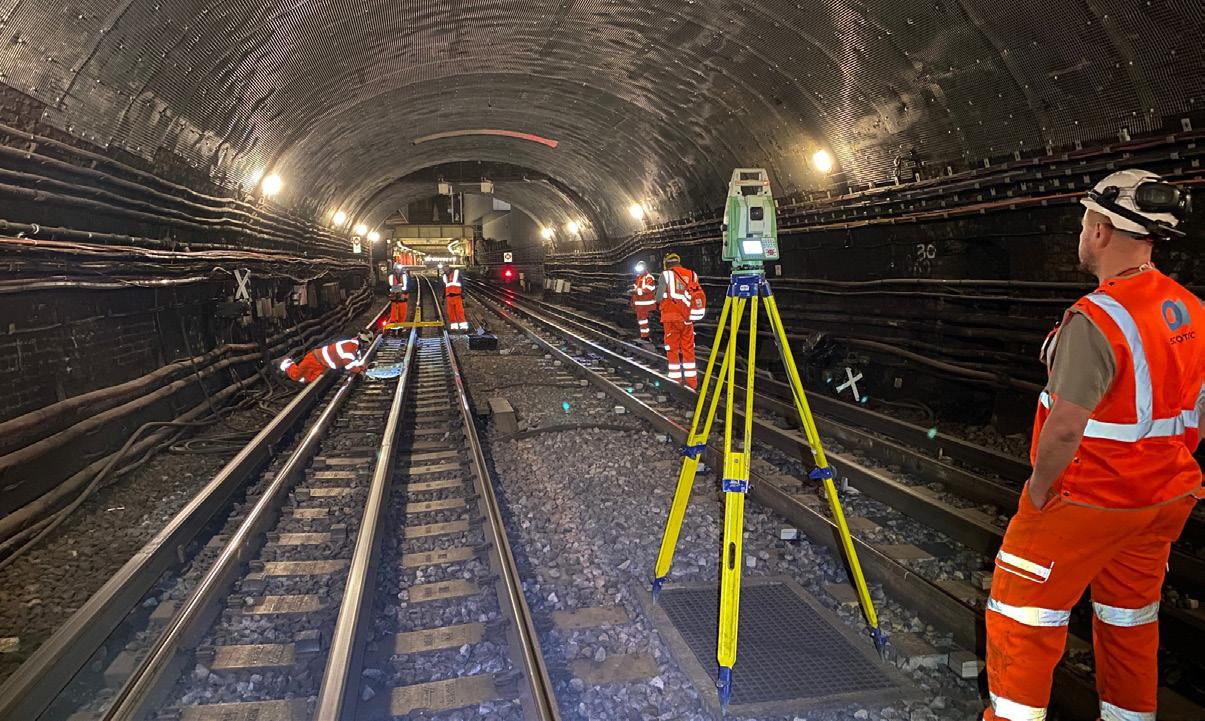
or re-utilised based on our activities, and this is especially true in the rail, highways, and utility sectors,” HildickSmith opens.
“The division also supports renewable energy, and there have been projects monitoring the dynamic behaviour of onshore wind turbine foundations and multi-million-pound R&D projects supporting universities
and major energy companies in the innovative design of offshore wind piles,” he continues.
In addition, the Infrastructure division supports construction and asset management activities in ports and energy terminals. This includes specialist surveys and monitoring around harbours, liquefied natural gas (LNG), and pipeline terminals.

Worldsensing is a global IoT pioneer and expert in monitoring large-scale and civil infrastructure through wireless technology. Together with a global partner network, we serve engineering customers in 70+ countries across mining, construction, rail and structural health.
Worldsensing technology is developed in-house by our team of engineers, ensuring the highest quality standards. They make data collection automation and wireless data streaming possible, from any sensor in geotechnical, structural, environmental, and process monitoring.
• Simple click-and-connect configuration
• Agile installation processes and network updates
• Low maintenance
• Compatible with geotechnical, geospatial and structural sensors from leading manufacturers and vendors
• Easy integration with 3rd party software
• ISO 9001, 27001 and 14001 certified
• Certifications in the major markets in the world
• Long-range, low-power communication system, based on LoRa star topology
• 24/7 connectivity management
• On-premise or cloud-based connectivity management
• Training and support

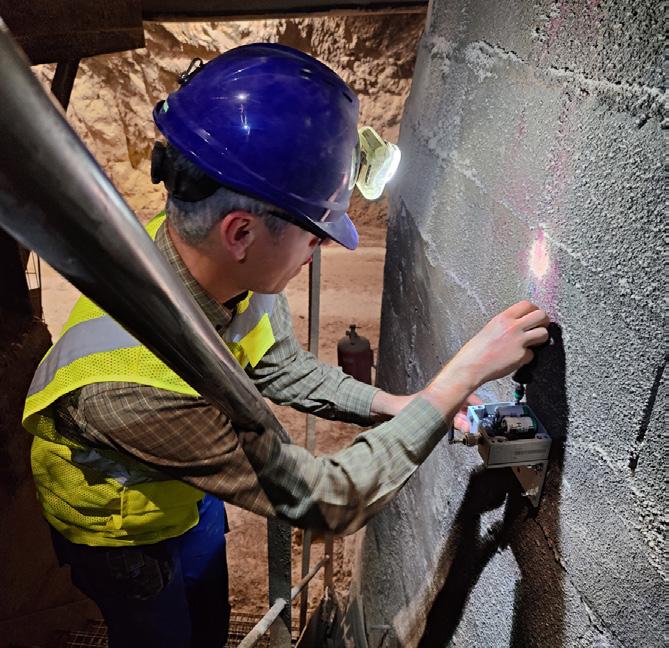




The increasing projects for LNG, carbon capture and storage (CCS), and offshore wind power all require significant onshore infrastructure that needs a range of TIC and asset management services.
The company’s integrated and diverse model links to the broader SOCOTEC UK divisions. As such, the services offered include water quality testing, asbestos surveys and management, building control, fire engineering, and environmental chemistry.
“One of our main advantages is our comprehensive scope of services, which are all under the same umbrella. Increasingly, end clients and their Tier 1 contractors are looking for fewer suppliers to deliver the work, similar to the Network Rail Control Period 7 (CP7) framework strategy, and we can provide a huge range of TIC services within the SOCOTEC UK sphere,
thus simplifying the commercial and operational execution,” Hildick-Smith explains.
Furthermore, the company’s targeted acquisition strategy intends to add businesses that bring something unique and valuable to the portfolio.
“Unlike other organisations, it is really important that acquired businesses are integrated into the overall structure of the UK business. Over a suitable period postacquisition, the teams, branding, and processes are merged, enabling a ‘one team’ approach rather than many silos. Equally, they maintain their specialisms, thus allowing the true benefits to be seen,” he informs us.
Recent examples include TOR Drilling, acquired in 2021 and now part of the Geotechnical Investigation BU within the Infrastructure division. The company is known for its expertise in handling complex geotechnical
projects, particularly those involving sonic logging, ground remediation, slope access, and hollow stem drilling systems. This has enabled a broadening and deepening of the Geotechnical Investigation services offered.
Another SOCOTEC UK acquisition in 2023 was that of IETG, who offers multidisciplinary support services within the water and wastewater sector alongside 40Seven, a company specialising in land and utility surveying. Hutton and Rostron, a pioneer of building pathology and the UK’s leading practice, was also acquired last year, whilst Impulse Geophysics Ltd (Impulse) was added in July 2024.
“All these businesses add something unique and enable the delivery of an ever-expanding range of services. Our strategy aims to identify acquisitions that broaden and complement the array of services offered, and the recent acquisition of

Impulse is a great addition to enhance the specialist survey of highway assets. It is an excellent example of focusing on niche specialism, driven by insightful data delivery.
“We endeavour to focus more on data analysis and insights rather than just data capture, surveys, and testing,” Hildick-Smith reveals.
Quality has always been a key part of the division. In fact, SOCOTEC UK was the very first business to be accredited with the UKAS 17025 standard for laboratory testing, calibration, sampling, and measurement services, holding the registration number 0001.
Aside from the vital quality certifications, one of the core priorities of the Infrastructure division is to deliver its pledges and commitments.
“The multiple concurrent projects linked with the limited pool of resources has meant that companies have sometimes struggled to deliver timely and high-quality outputs. Major projects, such as HS2, have absorbed project managers, engineers, and surveyors, among other resources. It is fair to say that delivering consistently high standards and turnaround times has been a struggle for the whole TIC industry.
“SOCOTEC UK is focused on delivering what we say we will deliver.
“ONE OF OUR MAIN ADVANTAGES IS OUR COMPREHENSIVE SCOPE OF SERVICES, WHICH ARE ALL UNDER THE SAME UMBRELLA”
– RICHARD HILDICK-SMITH, MANAGING DIRECTOR OF INFRASTRUCTURE, SOCOTEC UK
Ensuring clients are confident of receiving testing, data, and reports in the agreed timeframe is critical, and obviously, delivering these services at a competitive price is also important.
“Some clients and main contractors have tested the idea of self-delivering some TIC services. However, this has often proven ineffective due to the specialised nature of the knowledge, equipment, and ongoing activities needed to produce high-quality data,” HildickSmith outlines.
Advances in plug and play technologies have made capturing data increasingly simple, but the key
is combining and processing this data and turning it into useful information.
Data must be translated into something insightful and actionable so clients can utilise the information and make decisions.
In order to support this, unlike many other TIC companies, the Infrastructure division utilises in-house data reporting and visualisation platform, Datatys, to ensure clients have access to accurate data and alarms.
“This platform is used across multiple SOCOTEC Group countries, including France, Spain, and the US, enabling shared development to drive best-in-class performance. Having an internal platform enables true customisation for clients’ needs and ensures all data sources can be combined into a single platform. It also enables development into areas that really will advance the industry, such as AI.”
Environmental monitoring noise classification, for example, is an in-house, AI-driven logic development that enables environmental monitoring to not only create reports and alarms based on noise thresholds, but also identify the noise source.
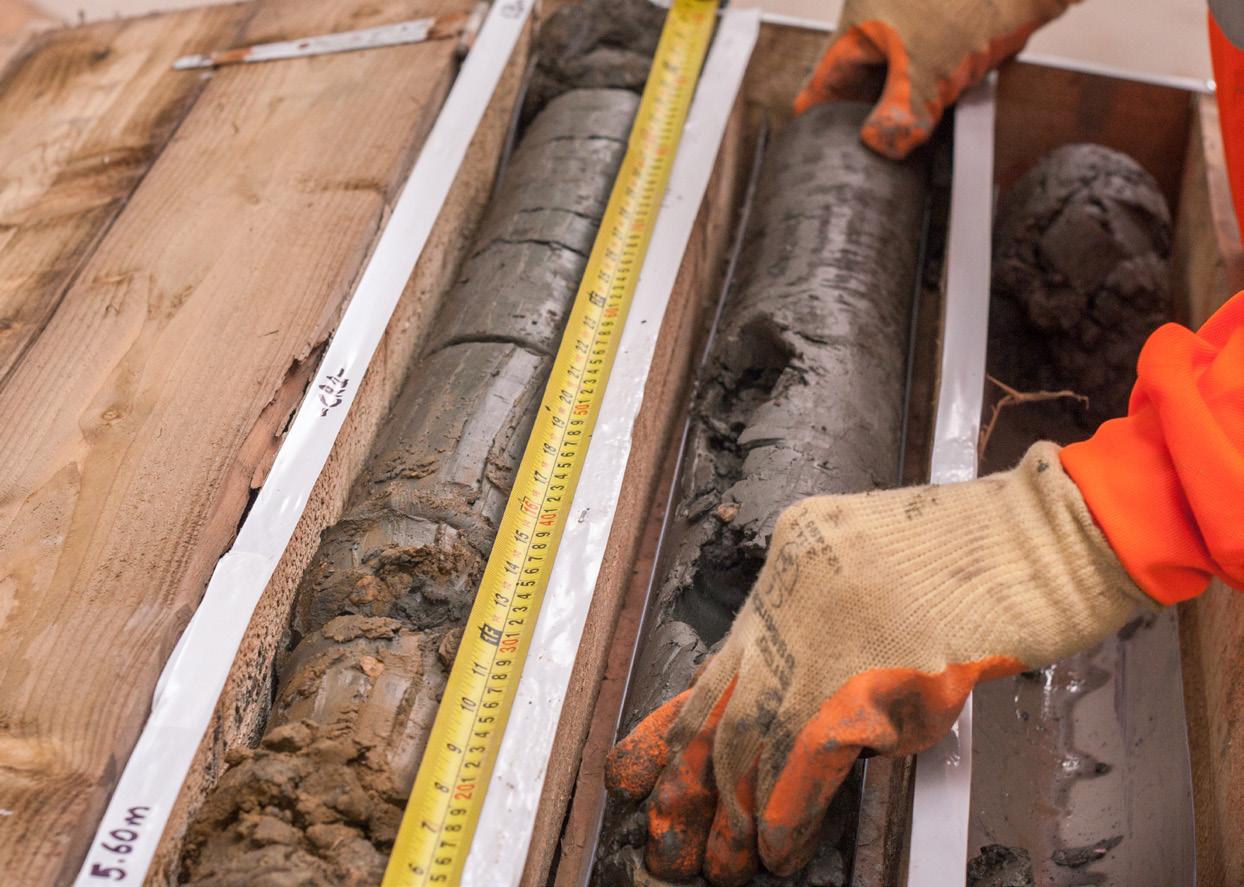
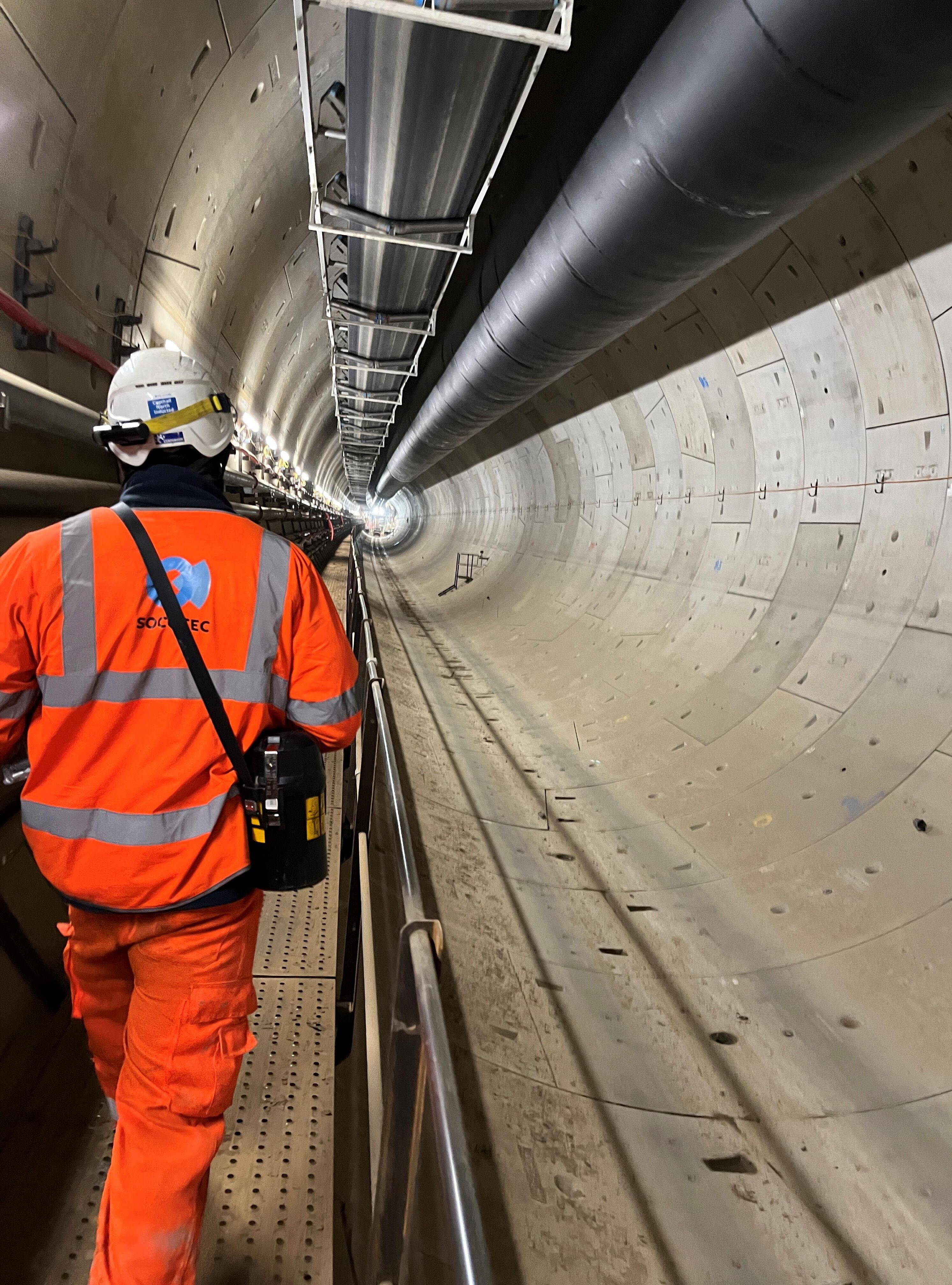

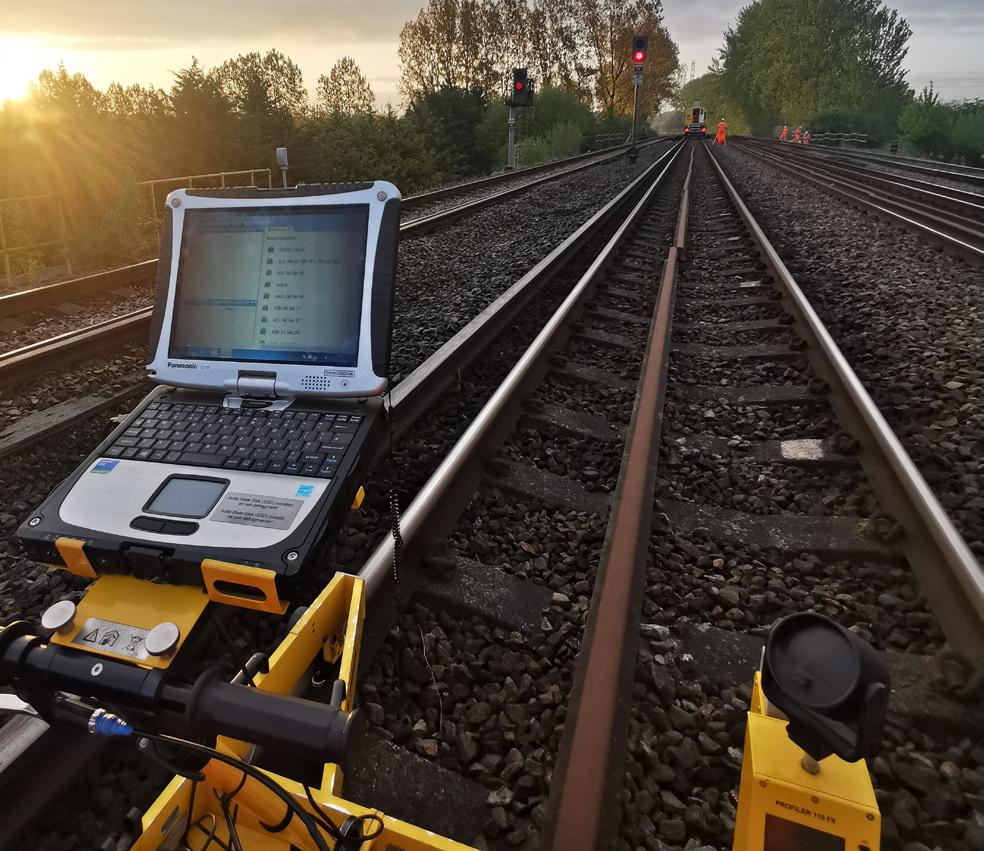
Other examples include survey crack identification and predictive trend analysis. The company also uses AI to produce faster, more consistent reports and conduct commercial and contract reviews.
“Using AI not just in the execution of projects but also the commercial side of putting contracts in place is key. Ensuring agreed terms and conditions and commercial governance is becoming increasingly important for many businesses, and being able to navigate these agreements quickly and efficiently is really important,” he points out.
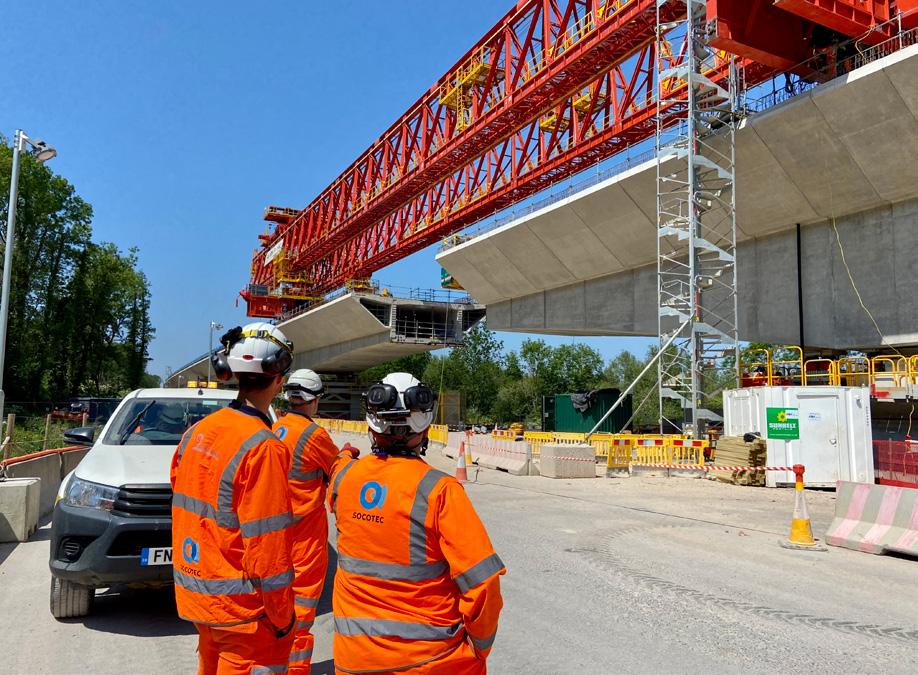
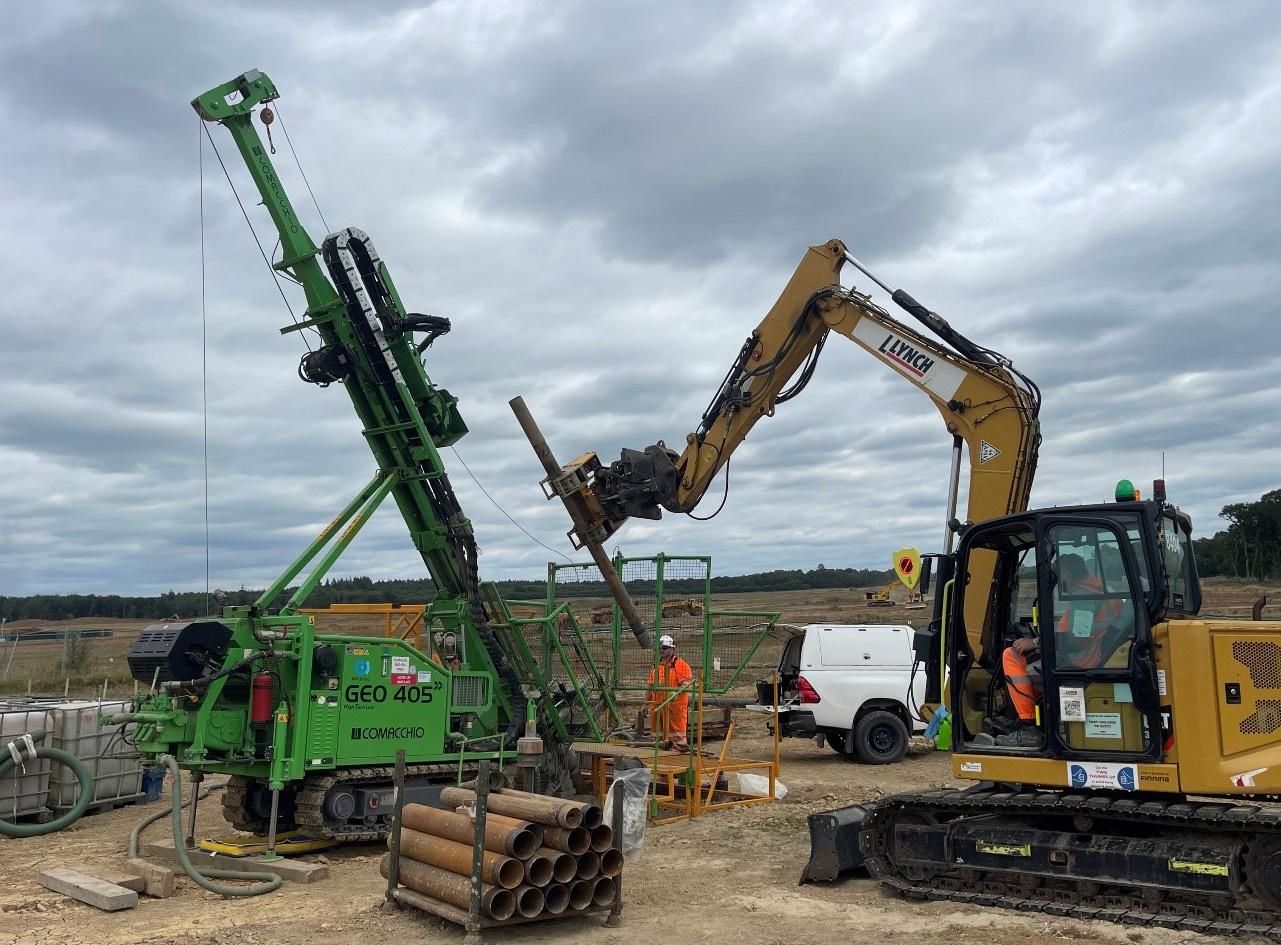
“Operational excellence is a term that is often used in the industry, but for me, it is really just a case of delivering what we say we are going to deliver, when we say we are going to deliver it.”
SOCOTEC UK has developed a number of operational tools in order to ensure this. The Geotechnical team, for instance, has specialist in-house software to improve the quality and speed of drilling logs, whilst the Materials Testing team has completed the roll-out of a new laboratory information management system (LIMS).
“Many materials testing companies use some sort of LIMS. Often, these can be glorified excel processes, but we have collaborated with Spectraquest for two years to help them specify and implement its first LIMS in the UK. Despite the significant cost, it is starting to deliver the quality and consistency our clients expect,” Hildick-Smith notes.
Despite a slowdown in new mega projects due to the UK macro climate, SOCOTEC UK still has many significant ongoing developments for
the remainder of the year. Despite the uncertainty of elements of HS2, there is a still a huge amount of work ongoing in 2024 and beyond, with SOCOTEC UK involved in the sections from London to Birmingham.
“The Infrastructure division has a broad portfolio, and although there is currently a pause in many new major infrastructure assets being constructed, there is an increasing necessity to manage existing railways, roads, and structures. All the Infrastructure BUs have involvement in delivering these later asset lifecycle services and we are seeing a significant growth trajectory in these areas,” Hildick-Smith acknowledges.
Moreover, there are areas where legislation is increasingly leading to growing demand for services, such as environmental monitoring, water quality testing, and building control, and SOCOTEC UK can confidently handle every aspect of these.
Major events such as the Grenfell Tower fire have led to changes in building control requirements for high-rise buildings (HRBs) and the continued risks surrounding reinforced autoclaved aerated concrete (RAAC) are also areas where SOCOTEC UK is supporting a range of clients.
“We are often involved in highly specialised or complex jobs that require exceptional execution. We work across a wide range of assets and infrastructure, including existing and new reservoirs such as Havant Thicket, historical locations like HMS Victory and Hurst Castle, major ports including Dover, Portsmouth, and London Gateway, power stations such as Drax, and major bridges such as Hammersmith and Forth Road bridges,” affirms Hildick-Smith.
Recently, some significant infrastructure periods have commenced that are really important for businesses involved in delivering asset integrity services.

“THERE IS AN INCREASING NECESSITY TO MANAGE EXISTING RAILWAYS, ROADS, AND STRUCTURES. ALL THE INFRASTRUCTURE BUSINESS UNITS HAVE INVOLVEMENT IN DELIVERING THESE LATER ASSET LIFECYCLE SERVICES AND WE ARE SEEING A SIGNIFICANT GROWTH TRAJECTORY IN THESE AREAS”
–
RICHARD HILDICK-SMITH, MANAGING DIRECTOR OF INFRASTRUCTURE, SOCOTEC UK
• Continue to deliver an integrated buffet of services to the construction and asset management industries.
• Continue fundamental operational excellence improvements to support delivering for clients.
• Focus on AI technologies that enable enhanced insightful data.
• Open a hub in Altrincham to centralise several of the northwest offices at one location and support growth in the area.
• Make strategic acquisitions to grow the buffet of services.
• Support the increasing demand for asset management, life extension, and risk management, including scopes in rail (CP7), utilities (AMP8), and multiple highways and bridge projects.
• Focus on the data side of the industry with higher margins and more specialised expertise.
• Continue to work with suppliers to develop industry capabilities.
• Grow revenue from €1.3 billion to €2.4 billion.
• Expand from seven international platforms to nine.
• One-third of revenues are presently Green Trust; by 2028, it will be 50 percent.
• Increase from a 12,000-strong workforce to 22,000.
• Expand from 200,000 clients to 300,000.


In the utilities area, AMP8 will commence in Q2 2025 and is expected to be four times larger than previous plans. Evolving regulations and the urgency of addressing climate change have necessitated water companies’ investment in infrastructure and technologies to reduce environmental impact.
Equally, the Network Rail CP7 period has just commenced and will involve a huge amount of TIC and asset management scopes that will be delivered by the various divisions across SOCOTEC UK.
“The reallocated HS2 funding for rail projects in the north, along with upgrades to the Transpennine Route as well as projects like Havant Thicket on the south coast and the
Haweswater Aqueduct Resilience Programme (HARP), provide a variety of opportunities for our division.
“Furthermore, investment in the energy transition, including onshore and offshore wind turbines, carbon capture and storage (CCS), and future developments at Sizewell, adds to the potential for growth,” Hildick-Smith concludes.
Tel: 01283 554400 www.socotec.co.uk
